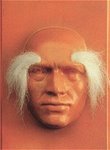 ‘Modern culture in crisis’: ‘the world is becoming ugly’, claims this month’s Ecologist magazine so I tossed it onto the shop floor and reached for Playboy. After fourteen minutes, I felt a growing sense of desensitisation so I retrieved the green magazine: it had stuck to the gum on my unlaced trainers. As my credit card was swiped, I felt good about myself and left the shop, ready for some brisk, fresh, air-conditioning. The mall was my oyster.
‘Modern culture in crisis’: ‘the world is becoming ugly’, claims this month’s Ecologist magazine so I tossed it onto the shop floor and reached for Playboy. After fourteen minutes, I felt a growing sense of desensitisation so I retrieved the green magazine: it had stuck to the gum on my unlaced trainers. As my credit card was swiped, I felt good about myself and left the shop, ready for some brisk, fresh, air-conditioning. The mall was my oyster.I was instantly reminded of my need for coffee and the cafes were a mere escalator ride away. Latte and ecology, enjoyed in a man-made biosphere: what could be better?
According to The Ecologist, quite a lot. Four pages are devoted to examples of ugliness. Some are predictable - fake tans and bagged salad - others are personal and poetic – ‘I feel ugly when I tread on a snail’- and then there is this one -
‘People. There are somewhere in the region of 6 and half billion of them, 60m in this country alone, barely sentient, clogging up the roads in their metal contraptions, obsessed with celebrity and fashion, constantly looking to fulfil their every want and fantasy by seeking a new high or craving sex (which frankly just results in more of them) and burning up resources like they were infinite. I’m sure some of them have utility but I would do away with most of them if I could.’
- which is either superbly sarcastic, or written by someone struggling to have his intimacy needs met by animal fur. You decide.
Inspired by the depressing article, here are my suggestions:
Nodding in agreement at a piece of reported speech, then reading ‘says Ann Widdecombe’.
Walking past a gym on a beautiful day and seeing people inside, on running machines, listening to iPods.
Waking up the morning after the night before, slowly becoming aware of the extent of film on my teeth and then discovering the remnants of onion rings on my lower molar
Shop fronts forced to deploy corrugated iron, which is then daubed with the graffiti of hatred.
Bad tempered, aggressive dogs – ever since I read a theory suggesting pets represent the owner’s inner child.
Unwashed pillows - a stark reminder of the drool that seeps out during sleep and our capacity to adversely affect the environment, even when deprived of consciousness
Maybe I should delete pillows soaked in spit, as I’m powerless to stop it. Real ugliness, brutally exposed by our animal loving friend, is neglect of responsibility – to oneself, to others, to the planet. It is depressing, but there is hope. Appalled by some consumer monstrosities, many readers are fighting back. They are angry at the depth of neglect. They are not allowing themselves to become detached and are acting within their communities. They are forcing change.
One reader had an opposite experience of a village in Southern Sudan. It had been heavily bombed and the women had lost their men. When the village was blitzed again, and they were told news of the fatalities, the women’s eyes remained lustreless, like shoppers on a day lacking must-have bargains. They displayed more concern for their flowers and livestock. The exposure to trauma had left them emotionally detached and their empathy for human life obliterated. They felt powerless.
Looking around at the mess in the food hall, (note my lack of action) I was reminded that plenty of filmmakers have suggested that shopping malls and suburbia can turn people into dispassionate blobs, who slowly lose their belief that they can be agents for change. It’s desensitisation by design. By contrast, ugliness can generate an energising response, one to be appreciated before it is bombed or brain-washed out of us.
Dispassion has helped create a bi-polar attitude. The Sudanese village women cherished the environment, with little regard to the life of the individual. The west cherishes the life of the individual with too little regard for the environment. For the developed world, it is as if the earth has become humanity’s Dorian Gray picture, its ignored decay a consequence of the belief that one can stem off the physical symptoms of the ageing process. (‘Because you are worth it’, remember?)
When presented with his picture of physical and moral ugliness, Dorian (‘a man with a wild terror of dying and yet indifferent to life itself’) tries to stab the painting and kills himself in the process. That could yet happen here.
In the nineties, an urban myth suggested Mc Donalds had developed plans to project its mighty ‘M’ logo onto the full moon, thus enlightening six billion hungry (some of them dangerously so) consumers of the corporation’s heavily salted produce. It is a shame that particularly ugly idea didn’t reach fruition. Maybe we would have gazed at our Dorian Gray picture without resorting to the knife. To paraphrase Oscar Wilde, even those of us gazing at the stars might have been forced to acknowledge the stench forming in the gutter below.


No comments:
Post a Comment